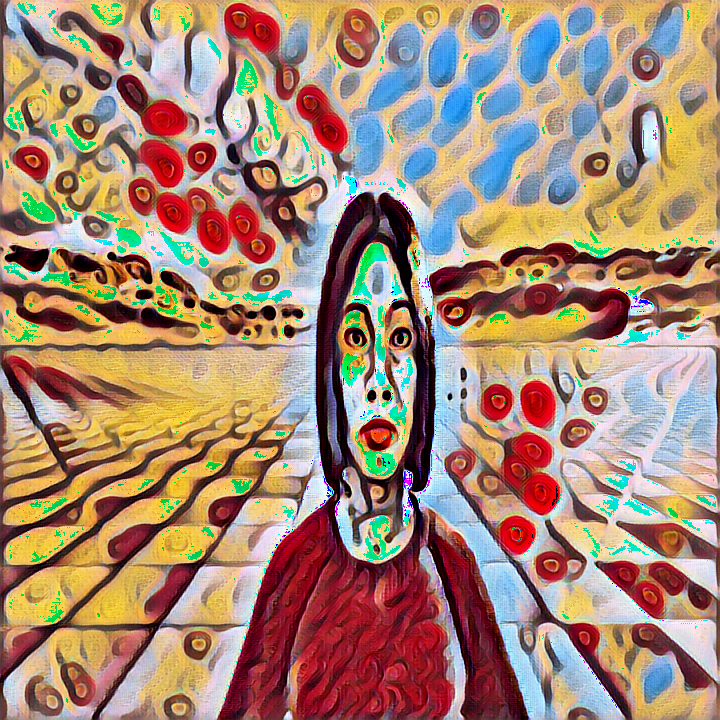- Download ONNX Runtime released Zip file.
- I chose
onnxruntime-win-x64-gpu-1.13.1.zip - Set its include directory and library dependencies in Visual Studio
- I chose
Example: FnsCandyStyleTransfer
This example is based on microsoft/onnxruntime-inference-examples.
I use Windows x64 platform, so LibPNG is a dependency: Compile and use libpng and zlib in Visual Studio

#pragma once
// fns_candy_style_transfer.h
// https://github.com/microsoft/onnxruntime-inference-examples/blob/main/c_cxx/fns_candy_style_transfer/fns_candy_style_transfer.c
#include "OnnxSample.h"
#include "onnxruntime_c_api.h"
#include <string>
class FnsCandyStyleTransfer : public OnnxSample
{
public:
FnsCandyStyleTransfer();
~FnsCandyStyleTransfer();
virtual void Run();
private:
bool Init();
bool EnableCuda();
void VerifyInputOutputCount();
bool RunInference(const char* input_file, const char* output_file);
const OrtApi* g_ort;
static void ResizeImage720(const char* rawPath, const char* resizedPath);
private:
const ORTCHAR_T* model_path;
const std::string execution_provider;
OrtSession* session;
OrtSessionOptions* session_options;
OrtEnv* env;
};
// fns_candy_style_transfer.cpp
#include "fns_candy_style_transfer.h"
#include <iostream>
#include <assert.h>
#include "image_file.h"
#include <opencv2/core.hpp>
#include <opencv2/imgcodecs.hpp>
#include <opencv2/highgui.hpp>
#include <opencv2/imgproc.hpp>
#ifdef _WIN32
#include <objbase.h>
#endif
#define ORT_ABORT_ON_ERROR(expr) \
do { \
OrtStatus* onnx_status = (expr); \
if (onnx_status != NULL) { \
const char* msg = g_ort->GetErrorMessage(onnx_status); \
std::cerr<< msg << std::endl; \
g_ort->ReleaseStatus(onnx_status); \
abort(); \
} \
} while (0);
FnsCandyStyleTransfer::FnsCandyStyleTransfer()
:g_ort(nullptr),
model_path{ L"../models/candy.onnx" },
execution_provider{ "cuda" },
session(nullptr),
session_options(nullptr),
env(nullptr)
{
}
FnsCandyStyleTransfer::~FnsCandyStyleTransfer()
{
g_ort->ReleaseSessionOptions(session_options);
g_ort->ReleaseSession(session);
g_ort->ReleaseEnv(env);
#ifdef _WIN32
CoUninitialize();
#endif
}
bool FnsCandyStyleTransfer::EnableCuda() {
// OrtCUDAProviderOptions is a C struct. C programming language doesn't have constructors/destructors.
OrtCUDAProviderOptions o;
// Here we use memset to initialize every field of the above data struct to zero.
memset(&o, 0, sizeof(o));
// But is zero a valid value for every variable? Not quite. It is not guaranteed. In the other words: does every enum
// type contain zero? The following line can be omitted because EXHAUSTIVE is mapped to zero in onnxruntime_c_api.h.
o.cudnn_conv_algo_search = OrtCudnnConvAlgoSearchExhaustive;
o.gpu_mem_limit = SIZE_MAX;
OrtStatus* onnx_status = g_ort->SessionOptionsAppendExecutionProvider_CUDA(session_options, &o);
if (onnx_status != NULL) {
const char* msg = g_ort->GetErrorMessage(onnx_status);
fprintf(stderr, "%s\n", msg);
g_ort->ReleaseStatus(onnx_status);
return false;
}
return true;
}
bool FnsCandyStyleTransfer::RunInference(const char* input_file, const char* output_file) {
size_t input_height;
size_t input_width;
float* model_input;
size_t model_input_ele_count;
// read the image data: float*
bool status = read_image_file(input_file, &input_height, &input_width, &model_input, &model_input_ele_count);
assert(status);
assert(input_height == 720 && input_width == 720);
OrtMemoryInfo* memory_info;
ORT_ABORT_ON_ERROR(g_ort->CreateCpuMemoryInfo(OrtArenaAllocator, OrtMemTypeDefault, &memory_info));
const int64_t input_shape[] = { 1, 3, 720, 720 }; // 1 * 3 * 720 * 720
const size_t input_shape_len = sizeof(input_shape) / sizeof(input_shape[0]);
const size_t model_input_len = model_input_ele_count * sizeof(float);
OrtValue* input_tensor = NULL; // this is a tensor
ORT_ABORT_ON_ERROR(g_ort->CreateTensorWithDataAsOrtValue(memory_info, model_input, model_input_len, input_shape,
input_shape_len, ONNX_TENSOR_ELEMENT_DATA_TYPE_FLOAT,
&input_tensor));
assert(input_tensor != NULL);
int is_tensor;
ORT_ABORT_ON_ERROR(g_ort->IsTensor(input_tensor, &is_tensor));
assert(is_tensor);
g_ort->ReleaseMemoryInfo(memory_info);
const char* input_names[] = { "inputImage" };
const char* output_names[] = { "outputImage" };
// inference
OrtValue* output_tensor = NULL;
ORT_ABORT_ON_ERROR(g_ort->Run(session, NULL, input_names, (const OrtValue* const*)&input_tensor, 1, output_names, 1,
&output_tensor));
assert(output_tensor != NULL);
ORT_ABORT_ON_ERROR(g_ort->IsTensor(output_tensor, &is_tensor));
assert(is_tensor);
float* output_tensor_data = NULL;
// extract output
ORT_ABORT_ON_ERROR(g_ort->GetTensorMutableData(output_tensor, (void**)&output_tensor_data));
uint8_t* output_image_data = NULL;
chw_to_hwc(output_tensor_data, 720, 720, &output_image_data);
bool ret = true;
if (write_image_file(output_image_data, 720, 720, output_file) != 0) ret = false;
g_ort->ReleaseValue(output_tensor);
g_ort->ReleaseValue(input_tensor);
free(model_input);
return ret;
}
void FnsCandyStyleTransfer::VerifyInputOutputCount() {
size_t count;
ORT_ABORT_ON_ERROR(g_ort->SessionGetInputCount(session, &count)); // Input Count = 1
assert(count == 1);
ORT_ABORT_ON_ERROR(g_ort->SessionGetOutputCount(session, &count)); // Output Count = 1
assert(count == 1);
}
bool FnsCandyStyleTransfer::Init()
{
g_ort = OrtGetApiBase()->GetApi(ORT_API_VERSION);
if (!g_ort)
{
std::cerr << "Failed to init ONNX Runtime engine.\n";
return false;
}
ORT_ABORT_ON_ERROR(g_ort->CreateEnv(ORT_LOGGING_LEVEL_WARNING, "FnsCandyStyleTransfer", &env));
assert(env != nullptr);
ORT_ABORT_ON_ERROR(g_ort->CreateSessionOptions(&session_options));
if (execution_provider == "cuda")
{
std::cout << "Try to enable CUDA...\n";
if (EnableCuda()) std::cerr << "CUDA is not available\n";
else std::cout << "CUDA is enabled\n";
}
ORT_ABORT_ON_ERROR(g_ort->CreateSession(env, model_path, session_options, &session));
VerifyInputOutputCount();
return true;
}
void FnsCandyStyleTransfer::Run()
{
std::cout << "------------------------------------------\n";
std::cout << "Sample: FnsCandyStyleTransfer\n\n";
std::cout << "ONNX Runtime Version: " << ORT_API_VERSION << std::endl;
if (!Init()) return;
// I don't have 720*720 image, so I use this function to resize image for the code running.
const char* input_file = "../assets/180_resized.png";
ResizeImage720("../assets/180.png", input_file);
const char* output_file = "../output/FnsCandyStyleTransfer.png";
bool success = RunInference(input_file, output_file);
if (!success) std::cerr << "fail.\n";
}
/**
* Use this function to generate 720 * 720 * 3 image.
*/
void FnsCandyStyleTransfer::ResizeImage720(const char* rawPath, const char* resizedPath)
{
cv::Mat img = cv::imread(rawPath);
cv::Mat imgResize;
cv::resize(img, imgResize, cv::Size(720, 720));
cv::imwrite(resizedPath, imgResize);
}
References
- Deploying PyTorch Model into a C++ Application Using ONNX Runtime
- microsoft/onnxruntime-inference-examples
- ONNX Runtime C++ Inference
- cassiebreviu/cpp-onnxruntime-resnet-console-app
- onnxruntime的C++ api如何实现session的多输入与多输出?
- Compile and use libpng and zlib in Visual Studio
- Deploying PyTorch Model into a C++ Application Using ONNX Runtime
- https://www.bilibili.com/video/BV1n3411u7sk/?spm_id_from=333.337.search-card.all.click&vd_source=98a02d91469172eca3b7b2f6a6d6c19e
